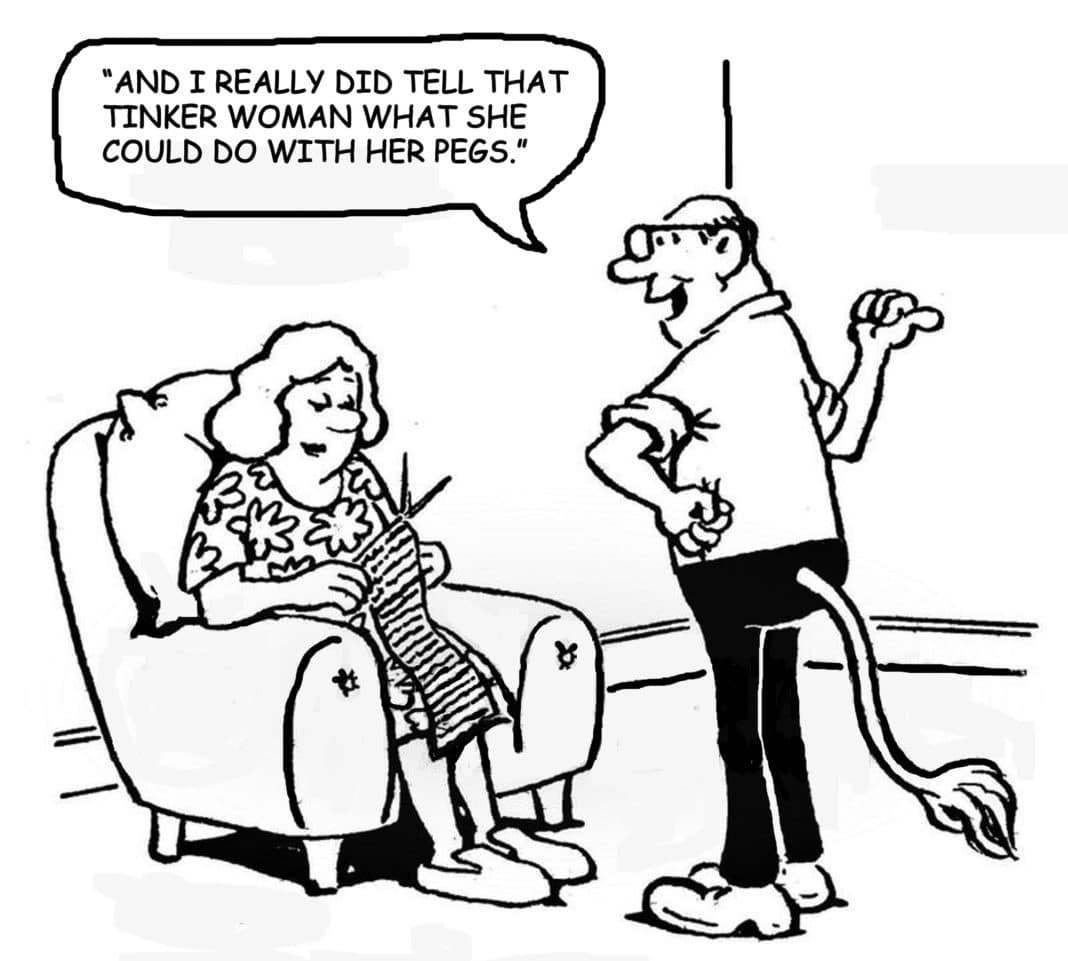
Are we allowed to use the word ‘Tinker’ anymore? One never knows these days! Anyway, like it or lump it, this week’s column is about Tinkers.
We wrote previously that one of the blessings of growing up in Ireland ‘back in the day’, was that everybody was accepted without question for being whom, what, and how they were. As for being equal we wouldn’t go that far in any society, but the common dominator was that ‘all were equal in the eyes of God’, and every man and woman was ‘the way God made them!’
The Tinkers were a part of that life. They were treated with dignity when they called to every door along country roads; where they would strategically erect a tent and make a ‘tinkers camp’ for a few days. The more affluent members possessed a horse-drawn caravan – but there weren’t too many of those on our road.
We knew a lot of tinkers by name and I suppose they would average a call once or twice a year.
There were ‘Dukes’, Paddy Kiely, and ‘Doyle the Tinker’ among the familiar ‘knights of the road’.
Many, were tin-smiths and provided an essential service to a rural community. Paddy Kiely was always invited into our kitchen, where he would lay his wicker basket of trinkets on the floor. A sale or pushing of his goods was never mentioned. He would be given a mug of tea and a slice of bread and he would in return, impart news items from within the parameters of his travels. Paddy travelled in a pony and cart.

‘Doyle the Tinker’ was a chimney-sweep and also a tinsmith. I remember him putting a new bottom in a galvanised bucket. No washers or ‘plumbers tape’; just metal against metal, but that bucket never leaked a drop of milk!
Doyle had his son with him and he was around my age. ‘Young Doyle the Tinker’ would play with my brothers and me around the yard. I knew his name – but I forget it now. A funny thing one day when we were sort of playing ‘hide & seek’, ‘Young Doyle the Tinker’ would peek around the corner of the house and shout “Up Joyce.”
My father laughed when I told him and he told me that Joyce was ‘King of the Tinkers!’ Father and son were noticeably close and the people said that the wife and mother died when the young lad was born. I wonder now what ever became of him …
There was an old man called ‘Gallagher’ who walked the roads. He had nobody nor nothing but the bag on his back. Gallagher was very tall, wore a hat and had a long white beard down to his waist. There was something sad in the demeanour of this soft-spoken Tinker, who called maybe once a year over all the years of my early childhood.
It was a hot summer’s day and the bees were falling out of the sycamore trees around the yard. Gallagher arrived in the gate and moved towards the open door. ‘God bless all here’, he said to my mother; and she replied, ‘and you too.’ It just so happened that she had a big saucepan (it had to be big pots in our house!) of custard and another of stewed rhubarb sitting on the Stanley range.
This operation was being monitored by us brats with the same intensity that the robin would be following the movement of a spade in the garden and waiting for the worm to be uncovered!
Mammy moved an outside chair into the shade and asked Gallagher to ‘take the weight off his legs.’ Next she arrived out with a bowl of steaming custard and rhubarb. I watched the man eat it – and even as a child, I could sense the indescribable pleasure this bit of food brought to our visitor. A child has no inhibition about staring at a person eating – and Gallagher didn’t care either.
I took it all in. His hand shook a little and the yellow droplets glistened like diamonds where they landed on his mighty beard. When he could get no more with the spoon, he ran the side of his finger around the dish and licked his grubby hand. Gallagher sat there quietly with the empty bowl in his hand until Mammy came to take it from him. I was still staring and I can still see the gratitude in his eyes as he told her; ‘it’s a long time since I ate anything like that; God bless you and your family.’
I believe that tinkers had their own language, but I never heard any of it. They would also do odd jobs for people – often just for food. Another service I recall was the sharpening of knives and repairing metal implements. The tinkers had many and varied skills. One showed me how to catch eels under the bridge. Others were ‘thatchers’ and repaired roofs.
The tinker’s trades gave their surnames to families, such as Smith and Thatcher. Does this make the late Margaret Thatcher a tinker? Only askin’ like …!
Don’t Forget
The chief reward for idleness is poverty.





